In a series of three blogs, CS careers advisers Emily Packer, Krista Cooper and Lucy Romijn introduce the ways in which students and graduates can stay up-to-date with the changing labour market. This edition focuses on resources – what to watch, read, follow and listen to, to help you stay informed
As we start to learn more about how Covid-19 is affecting the global economy, it is sensible to consider how such change might affect the labour market. Yes, there will be economic uncertainty and it will bring its challenges for employment. But there will be opportunity, too.
Here we aim to help you stay on top of the news and uncover your next step.
Staying up-to-date with the labour market and the changing supply and demand for products, skills and services is key to career planning

Why is it important to stay up-to-date with the labour market?
Staying up-to-date with the labour market and the changing supply and demand for products, skills and services is key to career planning. This is true in any economy – but takes on some acceleration in times of crisis and economic downturn.
Taking some time to engage with labour market information (LMI) will help you to:
- Identify where opportunities for employment might be created
- Build awareness of trends and changes related to your sector – what affect might it have on your career interests?
- Explore new sectors and roles that you could transition into
What’s the best way to use LMI resources?
Labour market information is useful to anyone mapping out their career – how you use it will change depending on the stage you’re at in your planning:
- Looking for ideas – could your career planning be inspired by sectors growing within these unprecedented times?
- I’ve got a few ideas – Use LMI to prioritise which sectors to focus your interest and efforts on in the next couple of months
- I have a clear idea – you can strengthen your applications with commercial awareness – how was your sector impacted?
Top tips:
- You don’t have to read, watch, follow and listen to everything we suggest, take a ‘pick and mix’ approach based on your individual needs/interests
- Use these resources as a starting point – you will likely find that they lead you to new ideas and sources of information
- Remember that things will change – bookmark resources and sign-up for updates
Follow
Follow funding and professional bodies linked to your sector or interests, for example:
If you’re currently engaged in research, now is a good time to keep an eye on the UKRI Twitter page, and those of other funding bodies for your research area. You’ll find information about extensions to funding and changing grant application deadlines. Reading these profiles can also be a good way of keeping tabs on the research priorities of funding bodies and enable you to find out about professional development, new programmes and opportunities.
Simply put, if you know how business is adapting to the virus, you will likely be able to see where future jobs might be during Covid-19 and into the recovery period
The McKinsey & Company ‘Shortlist’ – sign up for the newsletter
Often based on data and interviews with people in industry, the McKinsey & Company ‘Shortlist’ offers a weekly newsletter (each Friday) offers practical and research-led insight into how the virus is affecting and changing global business. Simply put, if you know how business is adapting to the virus, you will likely be able to see where future jobs might be during Covid-19 and into the recovery period.

Listen
Each week, Chris Webb and Helen Armitage from the Careers Service at Sheffield Hallam University are joined by guests from the world of industry, education or careers to discuss the potential impact of the Covid-19 pandemic, and the challenges and opportunities it presents. The first episode focuses on the Labour Market, and there’s more coming up on the impact Covid-19 is having on small and medium enterprises (SMEs) where a large portion of fresh graduates tend to enter the workforce.
The Economist: The Business of Survival
The Economist costs money to read, but its podcasts are free. There are a range of topics being explored – political, science and business – those that focus on the economy directly can help to build commercial awareness as COVID-19 changes markets and businesses think about adapting to the new labour market.
Why listen? If you understand how businesses are preparing, it can help you prepare too.

Read
Luminate posts a wide variety of articles, but the most useful at this stage are those providing information about recruitment and data about labour market trends. Prospects’ Luminate has articles about the possible impact of Covid-19 on the labour market, alongside research into the skills needs and growth areas in different regions across the UK. The site is regularly updated as new information becomes available.
EMSI Covid-19 Employment Dashboard
If data is how you like to absorb information, then the EMSI Covid-19 Dashboard is a useful page to follow. Giving a series of dashboards, the data shows where and in what volume job vacancies are being added or reduced across various sectors in the immediate government lockdown period. If you are not keen on big data, their blog is informative and breaks down the data headlines.
Watch
The Daily Check-In from Goldman Sachs
As the implications of coronavirus reverberate across markets, industries and the global economy, Goldman Sachs has launched a daily video series to highlight the latest insights from their experts around the world, recorded from wherever they are working. If you want to learn more about the global economy, delivered by real members of staff at Goldman Sachs, then this video series not only gives an update on the data driving the economy during Covid-19, but gives you access to the humans behind the numbers.
World Economic Forum
In this short video, a top economist talks about how the economy could be transformed for the better…
More videos and intelligent data can be found on their website. Learn about forces that are driving change across economies, industries and global issues.
Conclusion
Change is inevitable. These are unusual and unprecedented times for the economy, and staying informed through reputable resources can help us all to see opportunity as it arises.
If you find you have questions about your career planning after engaging with information on the labour market then please get in touch with us for an appointment. You are not alone, and staying informed will help you to navigate your options. We are here to help.
Next time we will be discussing the ways in which recruitment practice might change as a result of social distancing. This will include virtual internships – and if you’re interested in these already, check out those being offered by Inside Sherpa.



